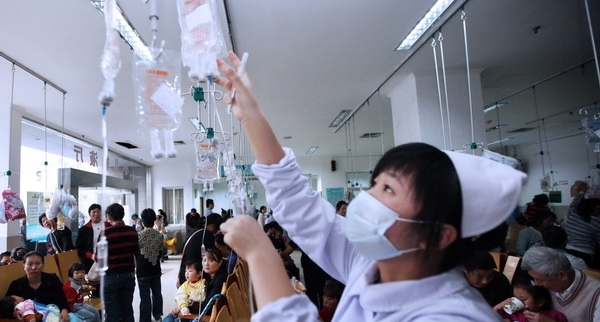

Highlights from the EO print edition, No. 559, Mar 5, 2012

Beijing to Encourage Private Investment in Medical Industry
News, Cover
~ Beijing is expected to launch a number of policies that will further encourage and guide the investing of private funds into the health-care sector this month.
~ Beijing municipal government announced the draft of these policies on Feb 9, which includes 18 preferential policies involving water, power, tax, human resources, prices and other policies that will encourage private capital to invest in hospitals, clinics and other medical institutions. These policies have become known as "Beijing’s 18 articles."
~ The first article is to fully open medical service market in Beijing, gradually increasing the proportion of health institutions that are backed by private funds.
~ Yu Chunjian (余春江), a neurosurgeon who founded a private hospital eight years ago, said his hospital has encountered many obstacles during its development. For example, the tax burden is still very heavy. Medical care is a service industry which involves high risks and investment of high-technology which is an additional burden for private hospitals.
~ Anotherfactor which has limited the development of private hospitals is the supply of professional doctors. Under the existing system, if doctors in the public hospitals flow to the private hospitals, they are not allowed to participate in the further assessment of professional titles, which is the equivalent of removing them from the public system. Therefore, although doctors envy the high salary in private hospitals, they can only choose to continue to stay in public medical institutions.
Original article: [Chinese]
Deposit Insurance Is Back on the Agenda
News, page 4
~ Discussions about establishing a deposit insurance system in China have recently been brought back to the table after ten years involving much talk but little action. At a central government meeting in January this year, the proposal to study and carry out the deposit insurance system was put forward once again.
~ According to an insider, China may refer to other national models when it comes to designing the insurance system. "The ideal way is to set up a government body" says Wei Jianing (魏加寧), deputy minister at the Development Research Center of the State Council.
~ However, a source close to the central bank revealed that the central bank plans to carry it out step by step, and a deposit insurance fund inside the central bank may be set up first, where fees will be charged in proportion to the deposits of the banks. The fund will be gradually developed into an ndependent body in the future.
~ Besides the risk management function of the deposit insurance system, five state-owned commercial banks will be required to join the system.
~ Wang Hongzhang (王洪章), head of China Construction Bank, recently commented, “the deposit insurance is very important for banks and we welcome the new system.”
~ In China, up until now, the state has been shouldering the cost of deposit guarantee implicitly, which lead to the reluctance of the banks to participate.
~ The EO learned that the frame has been fixed and Regulations on Deposit Insurance (存款保險(xiǎn)條例) have been drafted as well.
~ Zhou Xiaochuan (周小川), governor of the People’s Bank of China says that schemes have been carried out in 2007, but the process was halted because of the global financial crisis.
~ In 1997, the People’s Bank of China set up a research group to work on a deposit insurance proposal. In 2007, the central government formally decided to push ahead with a system. Zhou also said that the preparation proves to be efficient on the whole and the system will be carried out at the appropriate time.
Original article: [Chinese]

China Property Sales Rebound
Market, page 9
~ Property transactions in ten of China’s major cities rebounded in February after a steep decline in January. In response, the real estate (SWS) index increased over 20 percent in the past two months.
~ According to China Investment Securities, the "big four" state-owned banks held a symposium on March 2 announcing that they will lend more money to the qualified developers and speed up loan application approvals to boost supply of private sector housing.
~ Optimistic industry insiders saw this as a signal that the Chinese authorities are loosening credit policy to support China’s commercial housing market.
~ According to the Beijing government’s official website, the second-hand housing transaction volume in Beijing increased by 88 percent compared with the previous month. An employee of Beijing Homelink Real Estate Company told the EO that the main reasons behind the increase were lower interest rates and the expectation that the government would loosen policy restrictions.
~ "What influences the share price of real estate companies is not housing prices, but housing sales," Yang Delong, a senior equity strategist from China Southern Fund told the EO.
~ China has restricted bank loans to the real estate sector and limited citizens’ ability to buy multiple homes for over two years now. Most analysts agree that the discrepancy between the central government’s tight real estate policies and the trend among local government to seek to loosen housing policies will remain. They are still unsure of whether the rebound will continue or not.
Original article: [Chinese]
Time is Ripe to Accelerate Opening up of China's Capital Account
Market, page 11
~ China's economy is entering a critical stage, leading many to ask whether the country is presented with the perfect opportunity to reform or alternatively a period of high risks? How should China open its capital account?
~ In order to answer these questions, a research body within China's central bank recently released a report saying that the time is ripe to open up China's capital account. The report also outlined the three steps that China should follow in order to gradually open its capital account.
~ Over the next one to three years, China should relax controls on direct investment by foreign companies and encourage enterprises to "go out."
~ In the mid-term - three to five years from now - we should relax controls on imports and exports and promote the internalization of the RMB.
~ In the long-term - five to 10 years from now - we should lift restrictions on trading the yuan and open up the real estate, stock and bond markets.
~ The report's authors, who were drawn from the central Bbank, said that measures like interest rate and currency liberalization shouldn't be considered as preconditions for opening China's capital account.
~ This year, the government plans to promote capital account convertibility of the yuan and focus on the opening up of the securities market and personal capital accounts, according to Sun Lujun, head of the Capital Account Management Bureau under the State Administration of Foreign Exchange (SAFE). Based on this, China will allow more qualified foreign institutional investors to invest in the nation's capital markets as part of the QFII program.
Original article: [Chinese]
Wuhan Iron and Steel's Pig Farms
Corporation, page 19
~ The construction of pig farms and "urban modern service centers" by Wuhan Iron and Steel Corporation (WISCO) or (武鋼集團(tuán)) as outlined in their business plan for 2012, has caught the attention of many steel industry watchers.
~ Due to the lack of iron ore resources and the increase in the costs of distribution, the company saw annual sales fall to 230 billion yuan and profits to 3 billion yuan in 2011. According to the plan, the corporation will invest 39 billion yuan in non-steel related industries in 2012.
~ On Feb 14, WISCO announced it would lift steel prices in March. Other steel companies, such as Baosteel have also raised the price of steel accordingly. WISCO hopes to release price point pressure by expanding the business with resources as well as products.
~ On Feb 26, WISCO announced their plan to increase their initial 600 million yuan in investment in China Pingmei Shenma Group (中國(guó)平礦神馬集團(tuán)) to help secure the supply of coking coal. In order to cope with the funding pressure, WISCO also plans to issue three-year corporate bonds worth 7.2 billion yuan to help pay off debts that fall due in March this year.
~ Deng Qilin (鄧崎琳), the general manager of WISCO and a deputy to the National People’s Congress (NPC), put forward a proposal suggesting the central government reduce the tax burden placed on the steel industry.
~ WISCO recently started a project of intensive processing in Wuhan for recycling as well as new products such as materials used in the production of mascara and tires.
~ Deng predicts that "[the steel industry] will continue to earn low profits or make a loss into next year and WISCO will continue to face challenges in relation to iron ore shortages and increased logistics cost."
Original article: [Chinese]
New Security Requirements Spell Trouble for Courier Firms
Corporation, page 20
~ Beijing Municipal Postal Administration issued a notice in Feb requiring that all major courier companies in the city implement a new rule that says delivery personnel must open and check the contents of each parcel they collect and deliver starting from March this year.
~ This new rule will take effective nationwide from May 1.
~ Many courier companies in Beijing have already formally implemented changes so that employees can work in accordance with the new rules
~ This new rule has brought many problems for delivery companies. For example, couriers lack training in how to properly examine a parcel. It is hard for them to judge the nature of the goods directly by simply looking at it, which means that the security issues can not be solved completely.
~ Also it will lower the efficiency of couriers. One courier told the EO that he normallys collect about 50 parcels a day, but he only collected 38 parcels on March 1, the first day the rule was implemented.
~ There is also likely to be an increase in the cost of deliveries. A person in charge of a courier company told the EO that currently any potential increased in costs will be absorbed by the delivery companies.
Original article: [Chinese]

Special Feature: 10 Years of Hu and Wen in Power
Nation, page 25-32
~ This week's issue of the EO features an in-depth feature on the main topics that have been discussed at the annual meeting of China's two top political bodies, the NPC and the CPPCC over the past 10 years.
~ Starting from 2003, the first meetings at which Hu Jintao and Wen Jiabao were formally elected to their respective postions as president and premier, the special feature examines the main themes and official statements that were made during the political meetings from 2003 to 2011.
~ The special feature also includes analysis of issues and news stories that were of particular importance that year and that go beyond the scope of the "two sessions."
Original article: [Chinese]